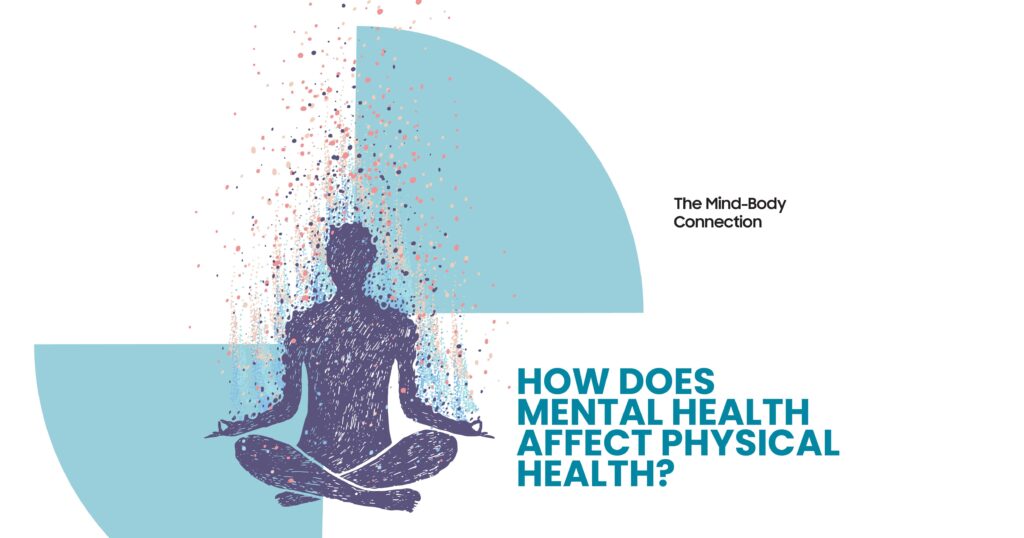Despite the fact that the body and mind of an individual are often regarded as separate areas and treated separately in case a person is physically or mentally ill, this can be a wrong approach. You may have already noticed that when you are emotionally stable and happy, your body also feels good – and this is not a coincidence.
Let us take a look at how physical and mental health are linked, what symptoms you may experience when there is an undiagnosed mental issue, and what can be done to strengthen your body and mind at the same time.
Does Mental Health Affect Physical Health?
The interconnectedness of mental and physical health is often disregarded by patients and healthcare providers alike. It makes sense that emotional stability and lack of mental health issues will have a positive impact on your body, just like various manifestations of mental health disorders will cause you physical discomfort and force you to neglect your physical needs in favor of mental ones.
Studies have shown that individuals diagnosed with mental illnesses are more likely to develop various health complications, especially when they get older or refuse to treat or manage the manifestations of their disorders. You cannot expect to be physically fit if you are anxious, stressed, depressed, or traumatized.
California Mental Health
Physical Symptoms That Can Stem From Mental Illness
How does mental health affect your physical health? Think about every time you have had an unexplainable physical discomfort ahead of an important event or during a particularly stressful life transition, such as relocation, divorce, or sudden unemployment. Headaches, digestive problems, extreme fatigue, insomnia, and muscle tension cannot be traced back to a physical illness or injury – on the contrary, they can manifest when there is an undiagnosed mood disorder or mental illness.

What Anxiety, Depression, and Trauma Can Do to the Body
Mental health professionals have correctly identified various mental health impacts on physical health, whether something caused trauma, or it is impossible to pinpoint the exact causes of someone’s depression:
- Your digestion becomes hypersensitive – you experience cramps, feel like you are about to vomit, and cannot deal with diarrhea using prescription drugs that typically help with this problem.
- Your heart is beating either too fast or too slow. Numerous cardiovascular issues are caused by emotional troubles the person has had to cope with especially if they left their mental disorder untreated.
- Your immune system is getting weaker. Your body can no longer protect itself from viruses and infections the way it used to in the past – if earlier you were able to function normally after a few days of bed rest, now you might need to take a whole week off to restore your health.
Chronic Stress and Its Long-Term Effects on Physical Health
If you decide to ignore stress that overwhelms you daily for many weeks and months, it may take a toll on your body:
| Adverse Effect | Description |
Respiratory Issues | A stressed individual often struggles to breathe normally – they hyperventilate which disrupts regular respiratory patterns. Cortisol and other stress hormones might lead to lung inflammation which makes you vulnerable to bronchitis and asthma. You may also have problems with your cough reflex, and it will limit your ability to deal with respiratory infections |
Autoimmune Disorders | Studies have shown that most people diagnosed with autoimmune diseases have been under an immense amount of stress as their symptoms became more evident. The likelihood of rheumatoid arthritis, inflammatory bowel disease, and multiple sclerosis is higher when you are exposed to various stressors |
Eating Disorders | A person who is anxious and stressed all the time is more prone to change their eating habits whether they are dissatisfied with their body image or want to find solace in food they enjoy without gaining extra weight. Anorexia, bulimia, and binge eating disorder are often induced by stress |
California Mental Health
Common Physical Conditions Linked to Mental Health Struggles
Unfortunately, most physical conditions affect mental health, especially if they force the person to change their life. There is no treatment that can significantly improve their condition, and the mental health needs of the individual are overlooked as everyone around them focuses on physical recovery. An illness or an injury that makes you stay home, quit your job, limit your time with family and friends, and take medication to cope with discomfort and pain will also have a negative effect on your psyche. People with diabetes, head injuries, heart diseases, arthritis, and epilepsy will feel insecure as they lose the ability to shape their lives and miss out on opportunities that healthier individuals are able to benefit from.
Heart Disease, Digestive Disorders, and More
Whether you went through a cardiac event, such as a heart attack or a stroke, or have been dealing with gastrointestinal issues such as irritable bowel syndrome, lactose intolerance, or Crohn’s disease, your mental well-being may be in danger.
You feel anxious when you need to undergo yet another medical procedure to stabilize your health, or you feel socially isolated because the illness forces you to withdraw from activities and events you have been accustomed to, which inevitably leads to yet another problem.
Be particularly mindful of your mental wellness if your relatives with similar medical issues have exhibited troubling symptoms or if your age and social status might cause anxiety, depression, or lasting trauma.
Small Lifestyle Shifts That Improve Both Mental and Physical Health
It can be difficult to make a monumental change in your lifestyle whether you are trying to optimize your nutritional intake or open your mind to new experiences. This is why you should focus on small changes that can go a long way:
| Advice | Description |
Improve Your Diet | You do not have to give up on your favorite food or stop eating meals rich in fat and sugar if it feels like an insurmountable task. There are ways to ensure your diet gets better with just a little effort – introduce fish into your diet, keep fruits as snacks, eat nuts and seeds a few times per week, and trick yourself into hydrating your body with sparkling water |
Take a Break From Screens | There are numerous benefits to limited screen time – whether you pause your work to minimize eye strain and do eye exercises or spend a few hours at a time without looking at your phone or computer, you can become more self-aware, sociable, and productive as well as enhance your vision and sleep routine |
Break Out of Your Routine | While in some areas of life routine and schedule can make all the difference, do not allow yourself to be stuck in familiar patterns that stifle your creativity. Treat yourself to new food, get to your workplace via a new route, dedicate a few minutes to reading or learning a language, and journal to keep track of your feelings and thoughts |
Support for Whole-Person Healing – Contact CA Mental Health
No matter what came first – your physical challenges or psychological struggles – you should not underestimate either of these problems, just like you should not disregard one part of your life to the detriment of another. The holistic approach to healing can help you improve the quality of your day-to-day life and cultivate a positive outlook that will affect your body and mind simultaneously.

Reach out to CA Mental Health now and schedule an appointment to discuss how mental health affects physical health and discover what can be done to help you feel vibrant and youthful again.
California Mental Health
FAQs
How does mental health affect physical health?
The brain and body are in constant communication with each other. If you feel scared, worried, irritated, or angry, it will change the way you sleep, eat, and work making you less focused, productive, and outgoing. Many physical symptoms you deal with during a time of increased stress are caused by emotional dysregulation.
Can mental illness cause physical symptoms?
A mental illness does not end with emotional distress – many symptoms are of a physical nature. You may feel nauseous and restless, struggle with headaches and gastrointestinal issues, and even experience seizures and tremors depending on the severity and longevity of your mental health condition.
What physical conditions are linked to mental health issues?
While there may be different reasons for someone to develop a physical condition, there is a chance arthritis, heart diseases, cancer, asthma, and other respiratory diseases might be attributed to poor mental health.
How does stress impact the body?
Stress can adversely affect any system of your body – the cardiovascular, gastrointestinal, and even reproductive system of a human being may be in danger if they forget to take care of their psyche during or after a stressful time in their life.
Can depression lead to chronic illnesses?
Research has proven that depressed people are more likely to suffer from chronic diseases such as diabetes, heart disease, Alzheimer’s disease, and osteoporosis. You feel shut down and numb during prolonged depression which increases the chances of you missing some of the early signs of a chronic illness.







